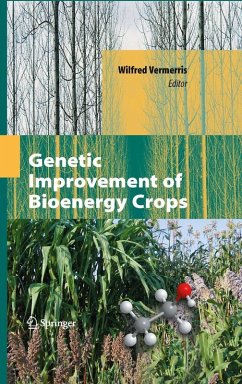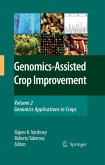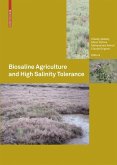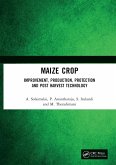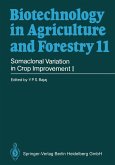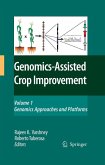Genetic Improvement of Bioenergy Crops
Wilfred Vermerris, Editor
Bioenergy is attracting increasing attention in science, industry, politics and the media as a means to address energy security, global climate change and economic sustainability. Biofuels - ethanol and biodiesel - currently represent the only alternative and renewable energy source available as liquid transportation fuel. The current production of biofuels relies heavily on food crops: grain and sugar for ethanol, and plant oils for biodiesel. This has raised serious concerns about food supplies, food prices, and long-term sustainability. Second-generation biofuels are derived from dedicated bioenergy crops that produce plant cell wall polysaccharides as the main source of fermentable sugars, as well as algae and non-edible oil crops as a source of oils and lipids for biodiesel.
The development of dedicated bioenergy crops requires an entirely different approach to plant improvement than what has been traditional for food, feed and fiber crops. This book presents an overview of the major bioenergy crops that can be used for the production of biomass and ethanol, with a focus on their genetic improvement. In order to maintain focus, biodiesel and the genetic improvement of oil crops are not covered. The available genetic resources are largely untapped and offer major opportunities to significantly enhance the contribution of bioenergy, while addressing many of the economic and ecological concerns.
The chapters have been written by experts in their field and target university students in plant sciences, biological engineering, or related disciplines, enrolled in a course on bioenergy crops. Researchers in academia and industry will find this book useful as well. The first part of the book provides background on the politics of bioenergy, the current ethanol production process, the biosynthesis and analysis of plant cell walls, andprocessing of biomass, and includes a primer on genetics and plant breeding. The second part of the book focuses on the genetic resources available to enhance individual herbaceous and woody species for use as bioenergy feedstocks. As a whole, Genetic Improvement of Bioenergy Crops provides the first comprehensive overview of the tremendous potential of dedicated bioenergy crops.
Wilfred Vermerris is Associate Professor at the Genetics Institute and Agronomy department at the University of Florida in Gainesville, where he manages an active research program on plant cell walls and their use in bioenergy applications. He is also faculty associate with the University of Florida's Plant Molecular and Cellular Biology graduate program, Adjunct Associate Professor in Agricultural & Biological Engineering at Purdue University and adjunct faculty member of Purdue University's Laboratory of Renewable Resources Engineering. He is co-author of the book Phenolic Compound Biochemistry (Springer 2006) and one of the three Co-Editors-in-Chief of the journal BioEnergy Research.
Wilfred Vermerris, Editor
Bioenergy is attracting increasing attention in science, industry, politics and the media as a means to address energy security, global climate change and economic sustainability. Biofuels - ethanol and biodiesel - currently represent the only alternative and renewable energy source available as liquid transportation fuel. The current production of biofuels relies heavily on food crops: grain and sugar for ethanol, and plant oils for biodiesel. This has raised serious concerns about food supplies, food prices, and long-term sustainability. Second-generation biofuels are derived from dedicated bioenergy crops that produce plant cell wall polysaccharides as the main source of fermentable sugars, as well as algae and non-edible oil crops as a source of oils and lipids for biodiesel.
The development of dedicated bioenergy crops requires an entirely different approach to plant improvement than what has been traditional for food, feed and fiber crops. This book presents an overview of the major bioenergy crops that can be used for the production of biomass and ethanol, with a focus on their genetic improvement. In order to maintain focus, biodiesel and the genetic improvement of oil crops are not covered. The available genetic resources are largely untapped and offer major opportunities to significantly enhance the contribution of bioenergy, while addressing many of the economic and ecological concerns.
The chapters have been written by experts in their field and target university students in plant sciences, biological engineering, or related disciplines, enrolled in a course on bioenergy crops. Researchers in academia and industry will find this book useful as well. The first part of the book provides background on the politics of bioenergy, the current ethanol production process, the biosynthesis and analysis of plant cell walls, andprocessing of biomass, and includes a primer on genetics and plant breeding. The second part of the book focuses on the genetic resources available to enhance individual herbaceous and woody species for use as bioenergy feedstocks. As a whole, Genetic Improvement of Bioenergy Crops provides the first comprehensive overview of the tremendous potential of dedicated bioenergy crops.
Wilfred Vermerris is Associate Professor at the Genetics Institute and Agronomy department at the University of Florida in Gainesville, where he manages an active research program on plant cell walls and their use in bioenergy applications. He is also faculty associate with the University of Florida's Plant Molecular and Cellular Biology graduate program, Adjunct Associate Professor in Agricultural & Biological Engineering at Purdue University and adjunct faculty member of Purdue University's Laboratory of Renewable Resources Engineering. He is co-author of the book Phenolic Compound Biochemistry (Springer 2006) and one of the three Co-Editors-in-Chief of the journal BioEnergy Research.
Dieser Download kann aus rechtlichen Gründen nur mit Rechnungsadresse in A, B, BG, CY, CZ, D, DK, EW, E, FIN, F, GR, HR, H, IRL, I, LT, L, LR, M, NL, PL, P, R, S, SLO, SK ausgeliefert werden.

